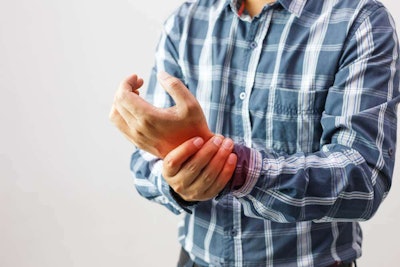 With higher rates of obesity and often poor diet and exercise habits, truckers are at risk for arthritis.
With higher rates of obesity and often poor diet and exercise habits, truckers are at risk for arthritis.Joint pain may be more than just a side effect of driving on rough highways. It could be arthritis, a common condition affecting more than 50 million adults that worsens with age, according to the Arthritis Foundation.
Arthritis causes inflammation in the joints. Symptoms include pain, stiffness, swelling, redness and decreased range of motion. In severe cases, arthritis can limit your mobility and burden you with chronic pain, making simple tasks such as gripping the steering wheel, climbing out of the cab or even just walking more difficult.
Arthritis is a blanket term for joint pain or joint disease. The two most common forms are osteoarthritis and rheumatoid arthritis. Osteoarthritis results from damage to a joint’s cartilage, which can occur over many years or be caused suddenly by an injury.
Rheumatoid arthritis occurs when the body’s immune system attacks the membrane around a joint, causing the membrane to become swollen and inflamed, says the Mayo Clinic. This form of arthritis can damage the cartilage, and even bone, over time.
Similar to rheumatoid arthritis is psoriatic arthritis. It affects some people who have psoriasis, which produces red patches of skin topped with silvery scales. In most cases, psoriasis is evident before a person is diagnosed with psoriatic arthritis, says the Mayo Clinic.

Risk factors for arthritis include a family history of it, age, previous joint injury and obesity. Women are more likely to develop rheumatoid arthritis, whereas men are more likely to develop another type of rheumatoid arthritis called gout.
Being overweight puts extra stress on the joints, especially those in the knees, hips and spine. Because truck drivers have higher rates of obesity and tend to get little exercise, many are at risk of developing arthritis.
Treatment and Prevention
If you suspect you’re suffering from arthritis, partner with your physician to narrow down what kind you have so you can come up with a treatment plan. Your doctor likely will conduct tests, such as X-rays or ultrasounds, and might recommend medications or physical therapy. In serious cases, you doctor may wish to perform a joint repair, replacement or fusion.
There are plenty of things you can do while on the road to relieve arthritis symptoms. As with many health issues, exercise and good diet can help. Both contribute to losing weight, which can be particularly helpful in preventing or relieving arthritis symptoms for an obese driver.
Also, exercise keeps joints flexible and often strengthens muscles around the joints. Stretching the afflicted joints also can help relieve pain and prepare you for exercise. It’s not necessary to go to a gym to exercise; you can walk around your truck while fueling or during other downtime. Plenty of exercises can be done with hand weights or with resistance bands affixed in your truck. Other exercises require no accessories.
As for diet, the Arthritis Foundation recommends eating anti-inflammatory foods such as broccoli, garlic and nuts. Adjust your diet and exercise routine slowly so that your body adjusts smoothly.
For temporary relief of joint pain, try applying heat pads or ice packs or taking over-the-counter pain relievers.











